Fighting Final Fantasy XII - Part 6: I Don't Like This Game, And It Breaks My Damn Heart!
By ZombiePie 24 Comments
Author's Note: If you missed previous episodes of this series here are the links to make life easier:
- Fighting Final Fantasy XII - Episode 1: Why, Oh Why, Is Vaan The Protagonist?
- Fighting Final Fantasy XII - Episode 2: If This Game Is Basically Anime Star Wars, Why Don't I Like It More?
- Fighting Final Fantasy XII - Episode 3: Hey Internet, Why Is FF12 Set In The Same Universe As Tactics?
- Fighting Final Fantasy XII - Part 4: The Characters And Story Deserve A Better Game
- Fighting Final Fantasy XII - Part 5: How Do You Judge A Game You Don't Like Until Hour Thirty?
Part 51: Thirty Hours In, The World Of Final Fantasy XII Becomes "Alive"
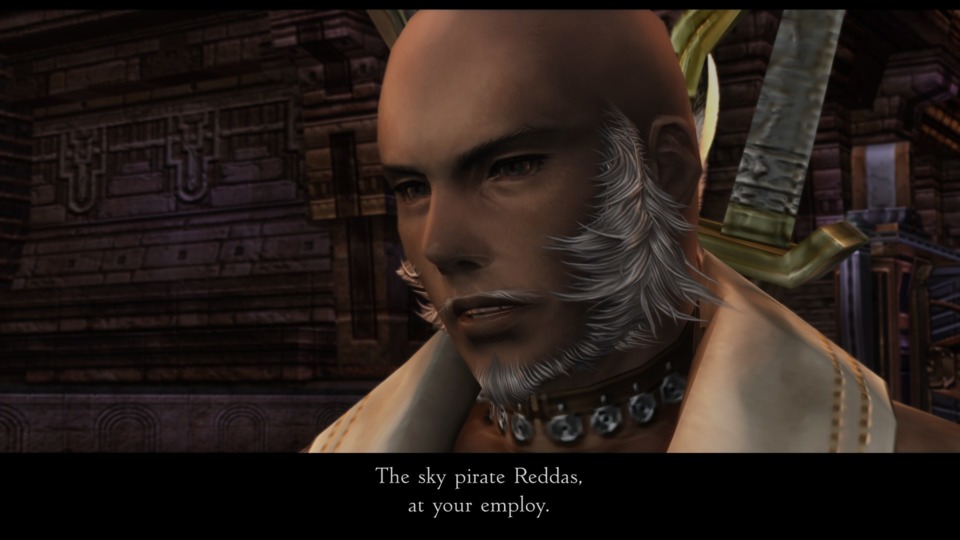
When we last met, our party was at the pirate haven, Balfonheim Port. There, they mulled over their options following their battle against Dr. Cid at Draklor Laboratory. Reddas, the de facto leader of the pirates, warns Ashe about Marquis Ondore's massive resistance fleet. With the Rozzarian navy assisting Ondore's efforts, even the slightest political shift could result in a global war. Basch fears Vayne is hoping to gather his opposition at a single location so he can use a piece of nethicite to obliterate them with ease. Afterward, Balthier reminds everyone Dr. Cid plans to meet them at Giruvegan. He states such a confrontation could provide an opportunity to use the Sword of Kings to destroy Cid's nethicite once and for all.
There are a handful of character moments at Balfonheim Port worth mentioning. Vaan pounces at any opportunity to interact with sky pirates and does so with child-like whimsy. And you know what? Vaan entirely works as a character during these scenes. Since the game's opening moments, we know Vaan fantasizes about becoming a sky pirate, and now his dream is within grasp. Not only does he "earn" the right to swoon with envy, but he treats everyone around him with the utmost respect. Better yet, since dispatching from Draklor Laboratory, he's toned down his smart-alecky one-liners in favor of genuine inquisitiveness. I cannot help but view this change as a massive improvement.
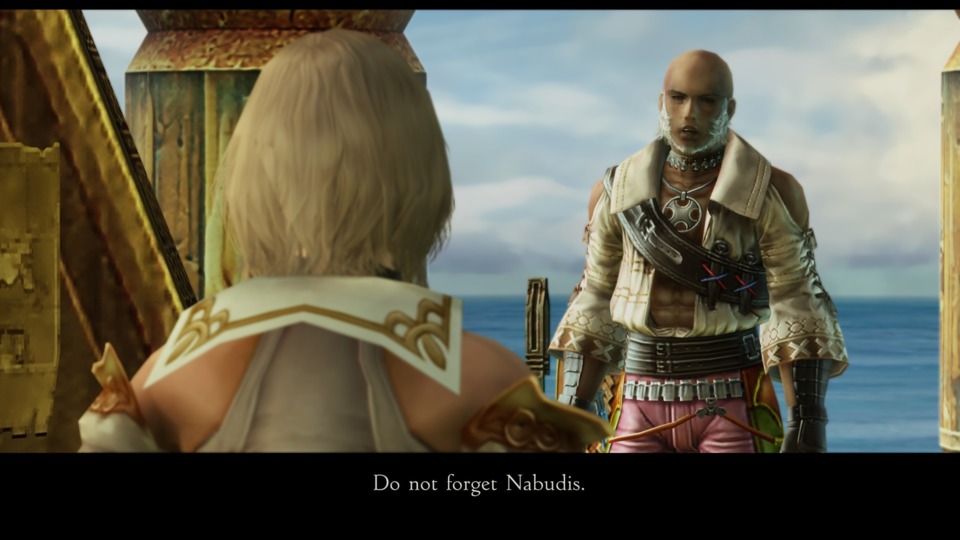
There are also moments when the story humanizes Reddas so you cannot dismiss him as a generic one-off character. When Vaan impresses him with his enthusiasm, Reddas turns to Balthier and jokes his "apprentice" is more of a sky pirate than him. Then, when Reddas parlays with Ashe, he asks how she plans to use Dr. Cid's nethicite. Ashe repeats she intends to destroy the shard but does not deny her desire to acquire anything that can safeguard Dalmasca's independence. Reddas doesn't judge Ashe, for he understands the emotions she's going through. Even so, he recalls the Empire's use of nethicite to destroy the city of Nabudis as a case study.
When our motley crew leaves Reddas' abode, they run into his lackeys: Rikken, Elza, and Raz. Undoubtedly, I cannot deny Elza's outfit is reprehensible. Nonetheless, because of how charming these characters are, they stuck with me. The game provides them with enough speaking time, so you don't forget their underlying conceits. Not to mention, Balfonheim Port continues Final Fantasy XII's tradition of using NPCs to lend a wholeness to Ivalice. The NPCs here are indisputably pirate-themed and have distinct quirks alien to the rest of the world. Yet again, the game manages to transport you to a world where you feel motivated to interact with everyone and everything around you.
All this adoration aside, there is one MASSIVE black mark against this portion of the story and Reddas' character arc in particular. As mentioned earlier, Reddas asks Ashe to reflect on the destruction of Nabudis. He is not the first person to cite the Empire's use of nethicite to wipe Nabudis off the map. However, in the case of Reddas, this singular event plays a crucial role in contextualizing his quest for redemption. As a result, it is A CRIME the Necrohol of Nabudis is an optional environment! Not only does it fill in a considerable gap to Reddas' character arc, but it also heightens the stakes of the story. Time and time again, we hear tales of the dangers of manufactured nethicite, but this is the ONE LEVEL, where we see what that means in context! It boggles my mind why this environment did not "make the cut," and yet countless other "filler dungeons" did.
Part 52: Final Fantasy XII's Reliance On Status-Effects Is Deflating
I'm going to keep my commentary about Final Fantasy XII's gameplay to a minimum. After six episodes, I have said all I want to say about its primary mechanics. Nonetheless, I still maintain my complete distaste for the game's default speed. Had I played the game at its standard rate, and without any of the Zodiac Age's quality-of-life additions, I would not have finished it. Besides, by the time I reached the game's final handful of dungeons, I started to notice something troubling. Not only was I struggling to get through the game's endless supply of trash mobs, but I was dying at a steady rate. I would say I saw more "Game Over" screens while getting through Giruvegan and the Pharos Lighthouse than the rest of my playthrough combined. There were a few reasons for this unfortunate situation, and I cannot say I am entirely blameless.
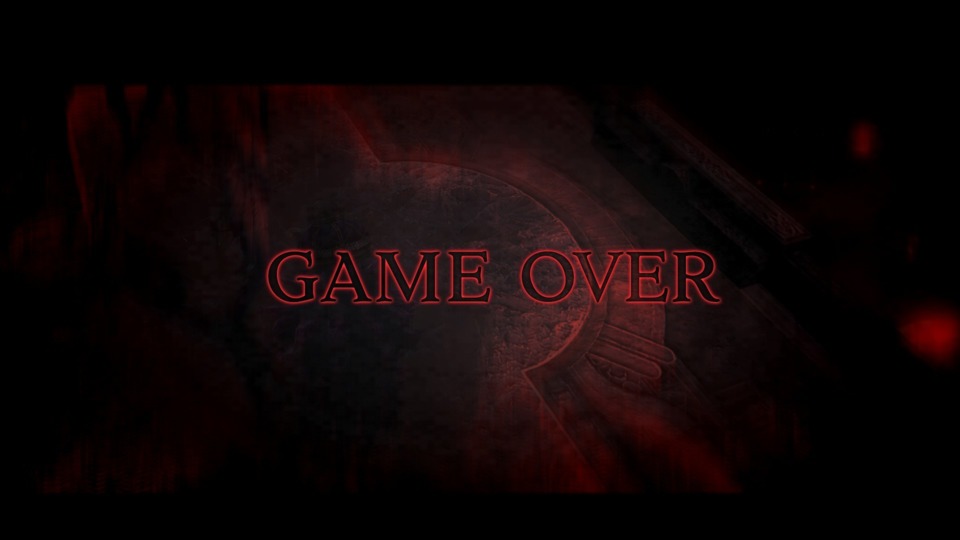
To my fault, using several of the game's exploits resulted in me developing some bad habits. My reliance on Dustia and Slime farming caused me to be ill-prepared for many of the game's nastier boss encounters. A comparable gaming parallel that comes to mind is the Drake Sword in Dark Souls. As many can attest, if you acquire the Drake Sword early in the game, you can coast on it until the last three levels. However, doing so deprives you of many custom made confrontations meant to communicate important concepts and ideas that come into force in the final handful of levels.
To my defense, Final Fantasy XII bakes grinding into every hour you play it, and I'm not just talking about the open-world dungeons. For example, the hunts operate on a difficulty scale fathoms above the story, and the amount of "optional" content in the game is absurd. If you have any desire to see everything Final Fantasy XII has to share, then you have to commit hundreds of hours into the game. However, by the game's midpoint, I found leveling my characters to be a complete bore. At some point, gaining new slots on the License Board stopped feeling special, and my job selections seemingly plateaued in power. Besides, with the best sets of equipment and spells locked behind random treasure chests or Byzantine side quests, the game's sense of progression begins to falter by level forty.
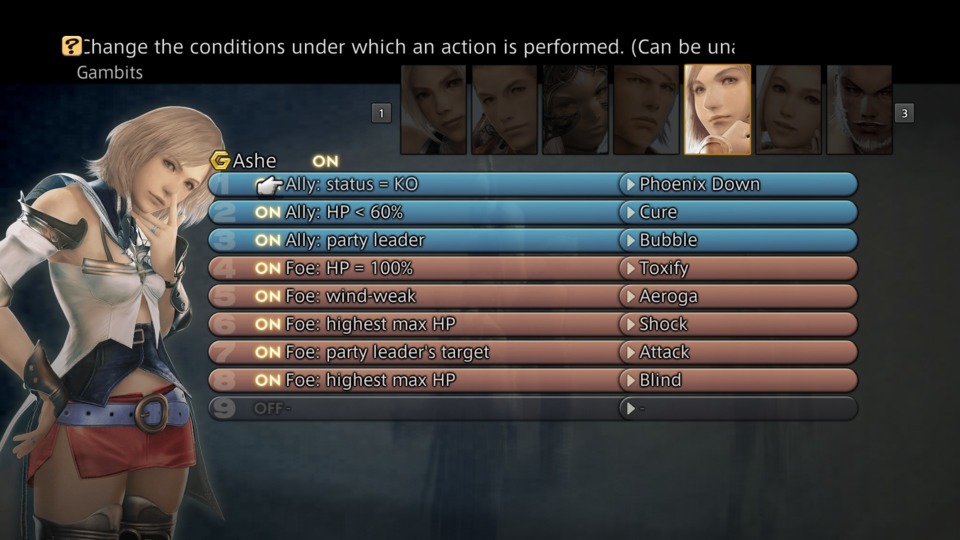
It's worth mentioning, in the Zodiac Age, some of the jobs top out earlier than others. By the time I neared the game's conclusion, I had some characters with nothing to spend their license points on, and others who needed three to four hours of additional grinding. Before you ask, I made a concerted effort to keep my characters at the same level. And yet, the progression of my characters was all over the place! Some characters felt like powerhouses, and others never ceased being liabilities. At no point did my Uhlan/Time Battlemage feel potent in combat. On the other hand, my Foebreaker/Shikari combination straight-up murdered fools in two hits! I have no idea what led to either scenario, and that's a massive flaw with the job system. You have no idea what the end goal is for any of these jobs, and often you don't have a clear sense if your selections are viable until it is too late.
Finally, I cannot underscore enough how cheesy the late game enemy-types become. First, the game starts throwing a TON of abnormal enemy types at you in the last few levels. At Pharos, in particular, the number of "flying" enemy types jumps dramatically. In this case, flying enemies render your melee-focused characters inert, which, in my case, translated to one-third of my party. Second, the game's hardest enemies often deploy every conceivable status effect on you! I cannot begin to list the number of times a Malboro at the Water-Steps combined "Disease" with "Poison" to hit me with a total party kill. In a game that plays out in real-time, what the fuck am I supposed to do in this situation?
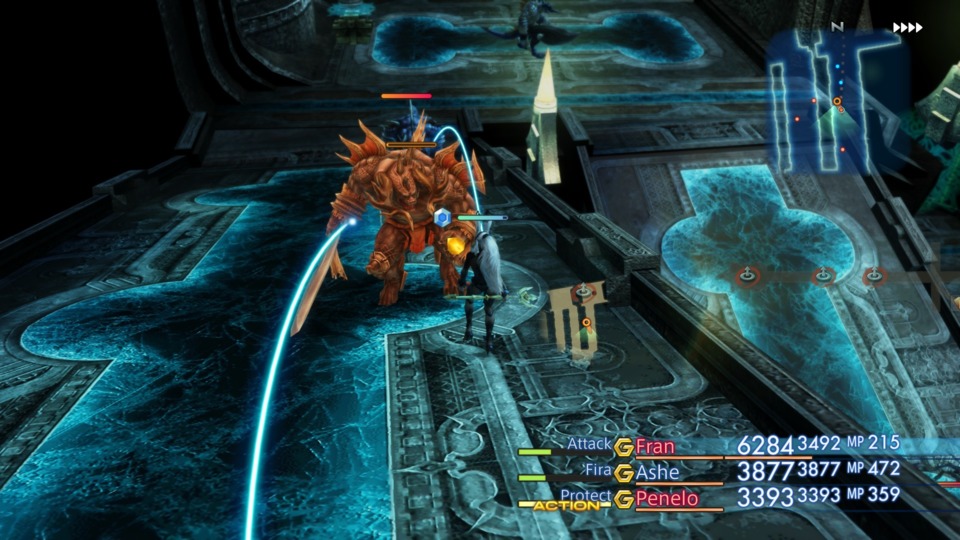
I understand I have groaned about Final Fantasy XII's over-reliance on adverse status effects before, so I'll keep this brief. An aspect of Final Fantasy XII's status effect system that drove me bonkers is how there is no rhyme or reason to how long the statuses last. Some effects, such as Stone or Disease, are permanent until remedied. Others, like Confuse and Sleep, will time out. Then, there are statuses like Berserk, which cannot be resolved when using a save crystal. Which reminds me, curing these statuses is no easy task as you have to buy License Grid spots to allow Remedies to behave as intended. And for whatever reason, the design team felt the need to decouple the value of "Esuna" in favor of status-specific spells and items. Which inevitably translates into a TON of clutter and redundant commands populating your character's Gambit slots.
Part 53: Let's Talk About Giruvegan, The Great Crystal, And The Misery Of Getting Lost
After a brief conversation with Reddas, Ashe endeavors for Giruvegan, even if Dr. Cid is planning a trap. In a short one-on-one scene, Reddas confronts Ashe and queries about her plans regarding Dr. Cid's nethicite. As with before, Ashe appears exasperated with her choices. She states rather plainly she only intends to "protect" Dalmasca, but cannot deny the innate power of Dr. Cid's artifacts. As she leaves, Reddas again reminds her to recall the destruction of Nabudis while leaving his relationship to its demise a mystery.
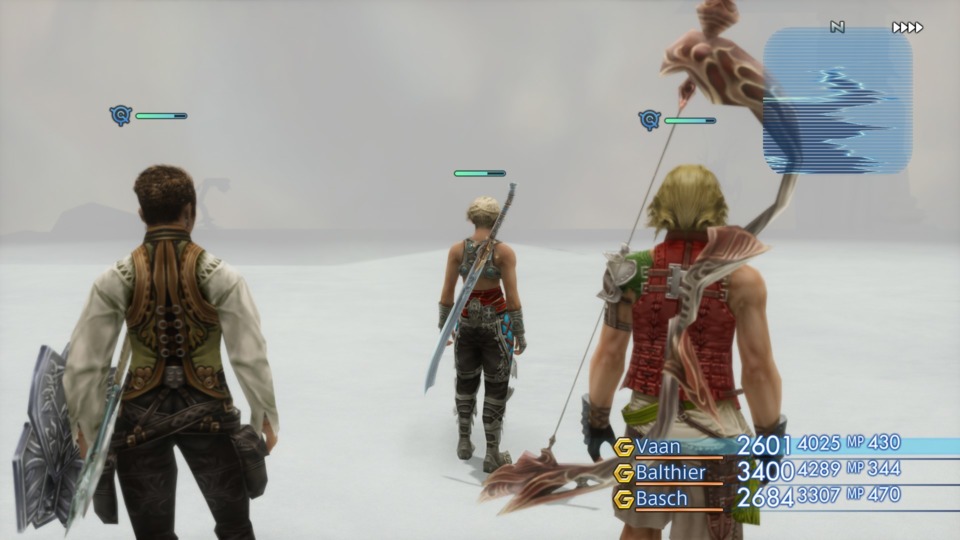
During our long trek to Giruvegan, our first new point of entry is "The Feywood." The Feywood starts an annoying trend in Final Fantasy XII of levels purposefully designed to get you lost. At The Feywood, Mist covers the environment, and the presence of the amorphous source of magic makes plotting your next steps a chore. While here, you are unable to use your mini-map and, instead, rely on temples and beacons. It's an admittedly "interesting" gimmick and does a good enough job of building up the mythos surrounding The Feywood, but it is nonetheless a pain to play.
First off, figuring out you need to go straight to progress through the level isn't that hard to discern on your own. The only reason why you might go off track is if you want to locate items or spells hidden in the environment. Which, might I add, continues to be a shitty part of Final Fantasy XII. Nonetheless, the real kicker comes when you encounter the entrance to Giruvegan. Here, you stand in front of an ancient door with no idea as to how to open it. Combing the environment for keys results in nothing, and interacting with the door doesn't lead to any helpful clues either. Talking to the door reveals it is the "Gigas Gate," but nothing else on how to open it up. Completely lost, I resorted to using a guide only to discover you unlock the door by summoning an Esper.

As the party reaches the footsteps of Giruvegan, they first defeat a giant djinn who goes down for the count rather smoothly. Unfortunately, upon entering the temple of Giruvegan, things are not as simple as they seem. For one thing, status-effect inflicting trash mobs plague the level. Even more distressing, the inner workings of the temple are a tangled series of steps, with the same repeating architecture. To make things even harder, players have to engage a series of switches to "activate" a patchwork of neon green invisible steps.
For one thing, the switches are large brick-like fireplaces you see countless times throughout Giruvegnan's Water-Steps, and MOST are not useful in advancing the game. Secondly, the stairwells are invisible until you walk on them. It's not as if turning the switches causes the walkways to pulsate brightly in the background. Instead, you have to go back to some far off corner in the level and see if you can bump into the stairwell's hitbox. To add insult to injury, this environment is one of the darkest levels in the game! Oh, but the worst is yet to come as we have not yet talked about "The Great Crystal."
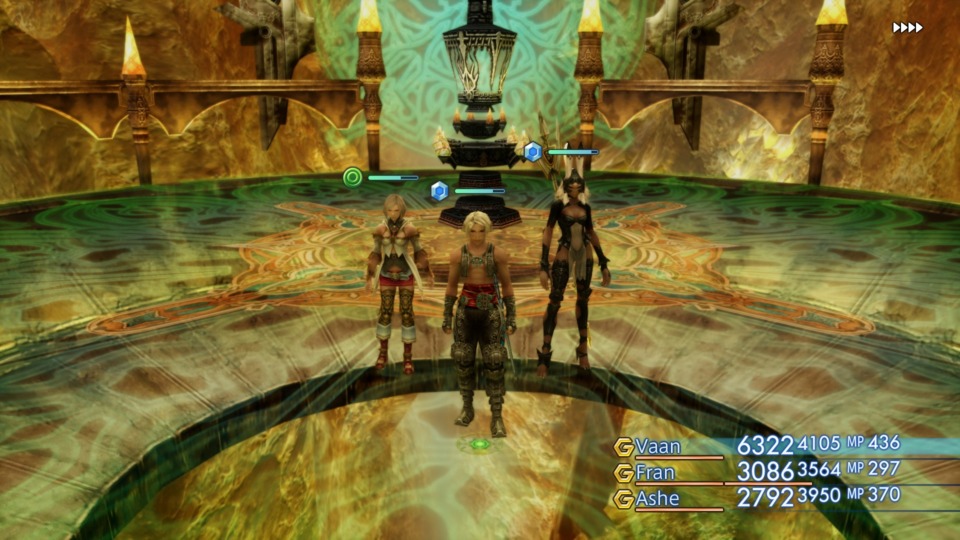
Admittedly, the Great Crystal is a beautiful level, but its design is atrocious! I DARE any of Final Fantasy XII's defenders to stand up for The Great Crystal; I double-dog dare you! For me, I repeatedly said to myself, "I don't know where I am, and this is taking forever, so I guess I'll use a guide." And this sentiment is entirely justified as the level repeatedly funnels you to dead-ends and expects you to double back to previous levels two load screens ago. As everything in the environment looks the same, it is incredibly easy to lose yourself and not know how to recover. On one occasion, I found myself hitting a switch at a dead-end, and not remembering if I needed to go down a left, center, or right pathway. Then, after committing to the wrong direction, I had no idea how to fix my mistake.
The Feywood, Water Steps, and Great Crystal are NO FUN to play as they make you feel powerless in the worst way possible. At the Water Steps, one wrong turn can result in instant death. In the case of the Great Crystal, you spend HOURS without the slightest clue knowing if you are going in the right direction. And yet, Square-Enix expects the player to rely on trial and error to solve these Mensa-grade puzzles. With the Great Crystal, there's nothing in the environment that clues you into which series of switches will progress you to the next location. It's shitty, and Square-Enix can do better!
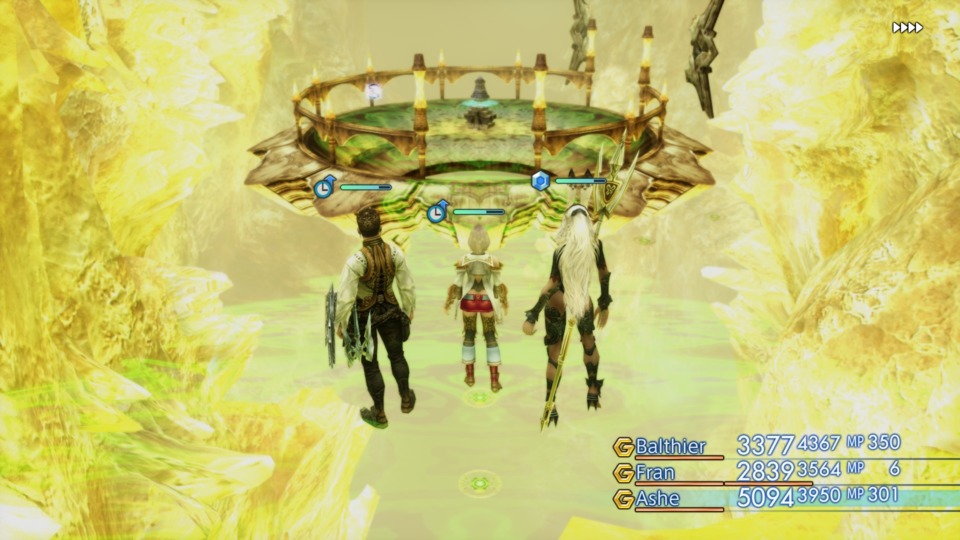
Part 54: The Occuria Are The Worst Part Of The Story
For the record, Final Fantasy XII has one of my favorite stories in franchise history. It does, however, have one Achilles' heel we now need to address. After completing "The Great Crystal," the story throws a narrative monkey wrench at you. As is the case in the world of Final Fantasy games, the master puppeteer, or in this case puppeteers, reveals itself. Here, Ashe confronts the Occuria, a race of omnipotent Gods who have, until recently, used their powers to control the fate of humankind. They reveal Venat is a heretic who is working with Dr. Cid and Vayne to separate the realm of humanity from the influence of the Occuria.
Before I delve deeper into the Occuria, I want to make it abundantly clear I hate their inclusion. I agree their addition does a lot to contextualize the actions of Vayne and Dr. Cid. But for the most part, they add unnecessary complexity to a story that desperately doesn't need it. Vayne, from beginning to end, is sufficiently conveyed as being a driven individual who gets what he wants. You don't need a pantheon of gods to make his motivations clearer. Likewise, I HATE how the specter of Prince Rasler is revealed to be an Occuria. I FUCKING HATE IT! Having Rasler's ghost be an Occuria removes a lot of the emotional potency of Ashe's earlier visions. Plus, it deprives the story of an empowering moment where Ashe faces her trauma before defying the will of Vayne.
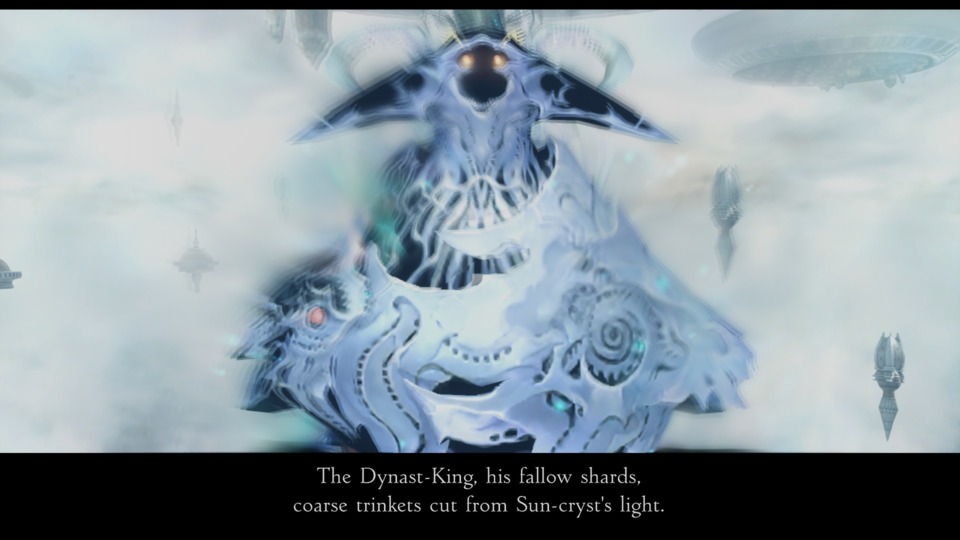
On a positive note, I like the sense of self-importance the Occuria communicate when speaking to Ashe. When Ashe asks them for more information about what they are, they collectively roll their eyes. Because the Occuria are NOT honest in their intentions, you know their solutions for the problems facing Ivalice are not "right." If anything, the Occuria being shitty puts even more agency in the hands of Ashe and our party. Additionally, given Dr. Cid is the one who asked us to go to Giruvegan, you get the sense he too faced the Occuria. In my imagined scenario, Dr. Cid and Vayne had a quick chat with their squid-like overlords and collectively said to each other, "Fuck these assholes!"
Nevertheless, what bewilders me most of all about this plot twist is how the story cannot OWN ITS SHIT! In actuality, the game does not bother to address the Occuria until the final minutes at the Pharos Lighthouse. This plot twist happens, and the game proceeds to forget about it for a solid FIVE HOURS! And it's not like the characters bring up the Occuria throughout the story! Instead, everyone states they do not trust the Occuria's intentions and moves on as if nothing happened. Worse, all the Occuria do is throw a sword at Ashe and tell her to cut off a piece of the Sun Cryst! At which I have to question if they should be in the game in the first place!
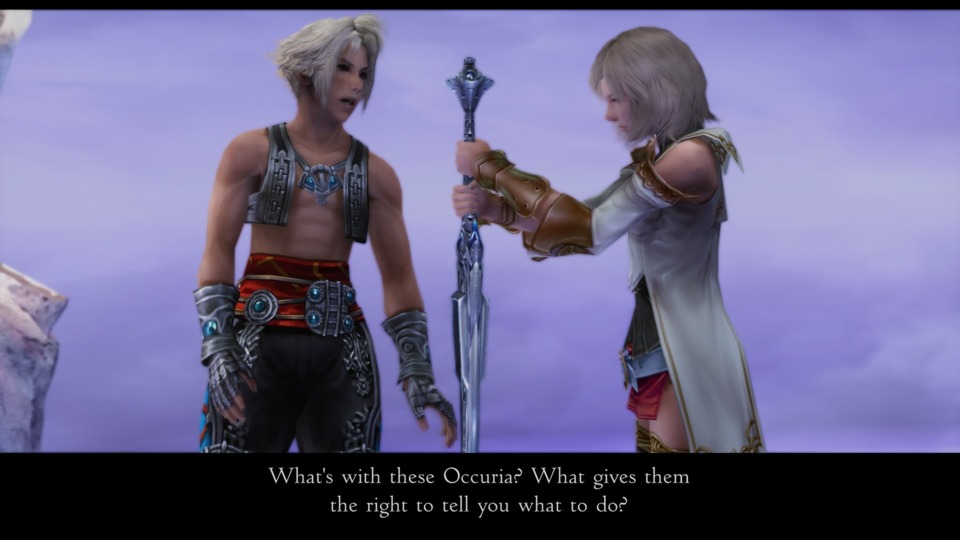
The world of Ivalice does not need another complicated pantheon of gods! We already have Espers, legendary kings, and countless other mythological figures from non-human cultures. And it does not help the majority of what the Occuria say is unintelligible gobbledygook! As if Final Fantasy XII doesn't already have a proper noun issue, the Occuria rattle off a new set of jargon at a break-neck pace. Worse, there's no supporting readings or quests which clue us into the history of the Occuria. They live and die in a very narrow sliver of Final Fantasy XII's story, and I wish this game fully committed to their existence. Say what you will about Final Fantasy X's plot twist of Tidus being a "dream person." At the very least, that game OWNS that shitty revelation and used it to pull off one of the greatest endings in video game history!
Part 55: The Pharos Lighthouse Is BULLSHIT!
After your party makes its way back to Balfonheim Port, they reconvene with Reddas. The pirate king surmises their only option is to find the Sun Cryst and destroy it. Only then will it no longer be a worrisome weapon of mass destruction. When Fran and Balthier suggest they cut off a piece and use that as a weapon, Reddas shudders at the thought. He once again cites the ruin wrought on Nabudis and implores our company to stick with more practical tools of destruction. Because, you know, shooting motherfuckers with guns is TOTALLY CIVIL! In terms of our next stop, Reddas mentions observing the "Ridorana Cataract" and "Pharos Lighthouse" on official paperwork at Draklor Laboratory.
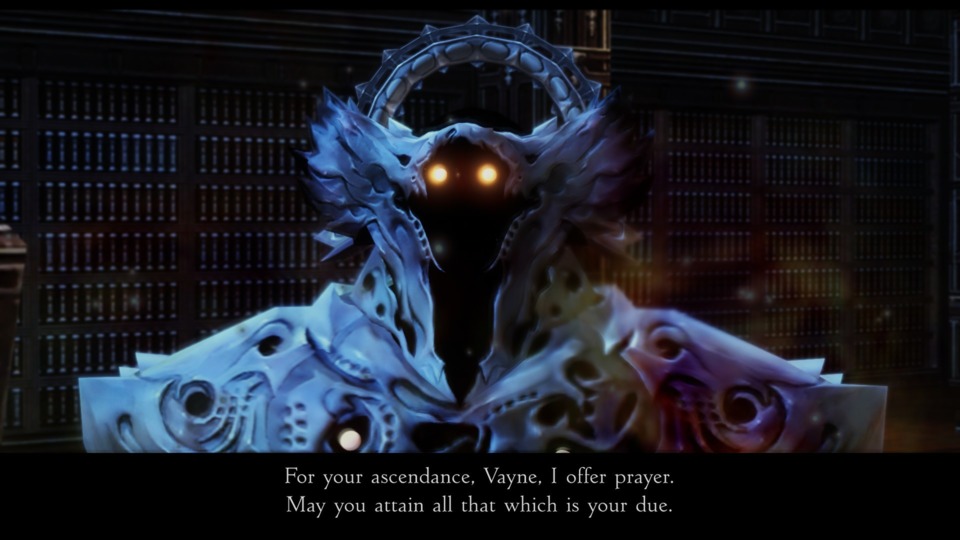
After boarding Reddas' airship, our party of misfits plots a course for the Ridorana Cataract. What ensues next is a frustrating adventure complemented by some of the best story moments in the game. The Pharos Lighthouse has four parts to it, and they each painfully overstay their welcome. Seriously, the last two ascents at Pharos made me want to eat my eyeballs out! Conversely, each environment is an impeccable tour de force of environmental design and character-driven storytelling. Each ascent truly is a test of our character's might, and you never lose sight of the stakes at hand as you progress further up the lighthouse. To cap it all off, Ashe, Balthier, Reddas, and Gabranth each have heart-wrenching and poignant moments at the lighthouse's summit.
In this chapter, I'm going to review why I think the Pharos Lighthouse subjects the player to the worst level design in the game. Short of The Great Crystal, Pharos represents a low point in terms of playing Final Fantasy XII. While I understand the thinking behind it, the level is too goddamned long for its own good. By the second ascent, I felt more at war with the game's elongated and arbitrary design than the metaphorical manifestations of the character's trauma or moral dilemmas. Again, I understand why Pharos is the way it is, but that doesn't make playing it "fun."

Moreover, Pharos features some of the most malicious game design I have ever seen in a Final Fantasy game. To illustrate, at the lighthouse's entrance, a straight line of party killing mines guards the first save crystal. And the assholish game design doesn't stop there! I cannot begin to tell you how many "Black Orbs" I failed to pick up because they disappeared before my characters finished their canned animations. I wish you knew how I felt when I accidentally eliminated the "Attack" command after picking the "Altar of Steel" on the second level. I wish I had a picture of the face I made on the third ascent when I realized I had forgotten the color of my level two altar. All of these moments are shitty and make an already long and sluggish dungeon ten times worse.
Rather than subject you to a close reading of each ascent, I'm going to limit myself to the worst parts of Pharos. The first of these returns us to the issue of the game's status-effect afflicting trash mobs. At Pharos, the "Disease" status-effect is in full force. As mentioned earlier, the effect drops your character's total HP to one point. In this case, random enemies lurking in the background often KO-ed my characters while I was queuing up restorative spells. This exact issue is even more problematic when confronting bosses as a single area-of-effect spell can result in immediate doom.
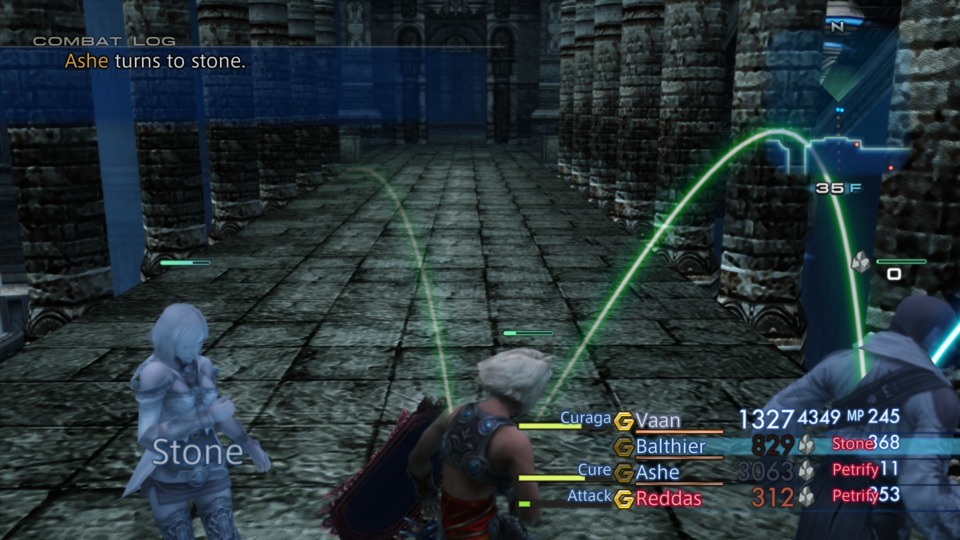
The second mind-numbingly terrible design choice is the incorporation of an excessive number of puzzles. None of these puzzles are "hard" per se, but they absorb more of your time than they should. For example, picking up "Black Orbs" during your first ascent isn't difficult, but it sure is finicky. The same can be said when you encounter the "Brainpan" and "Deidar" enemy types. Killing either will collect green or red pieces, respectively, to construct a bridge. However, the two colors negate each other, and killing one enemy will erase one bridge piece of the opposite color. It's not impossible to program your party members to behave as you want, but it still takes up an annoying amount of time.
I am, of course, overlooking the worst part of the Pharos Lighthouse. That would be the puzzle found during the third ascent. Upon entering the final part of the tower, you find several color-coded beacons. Here, if you select the wrong lantern twice, the game teleports you to a basement where you fight an army of undead soldiers, which very quickly can end your game. Worth mentioning, earlier, you selected a color-coded beacon on the second floor to disable an in-game quality-of-life feature. For example, if you pick the yellow "Altar of Wealth," you will be unable to use items until you complete the tower. What I find especially heinous is what occurs at the end of the third level. While here, you need to select the matching color of the beacon you picked from level two. If you forget this color, the game transports you to the first floor!
Part 56: But Hey, At Least The Story Is Good!
Luckily for all involved, the story gets especially compelling at the Pharos Lighthouse. In an earlier cutscene, Larsa confronts his brother, Vayne, about his aggressive posturing towards the rebellion. When Vayne cites Ashe's march towards the lighthouse as evidence of her imminent hostilities towards the Empire, Larsa assures him Ashe will prove her peaceful intentions. Seeing an opportunity to quiet Larsa once and for all, Vayne sends Gabranth to Pharos. If Ashe proves to be an enemy of the Empire, Gabaranth will kill her. However, if she proves to be honest and virtuous, Vayne will consent to a ceasefire.
As you make further progress up the tower, there are several moments where the supporting cast loudly questions what Ashe will do at the top. Some are confident she will do the right thing and destroy the Sun Cryst, and others wonder if she can use it to bring Vayne to his knees. Somewhat humorously, all of these scenes feature Ashe in the background to suggest she can overhear these conversations. In my imagination, Ashe slowly begins to hate her party members as they continue to talk behind her back. However, these asides ensure you always understand what is at stake as you toil away at the tower.
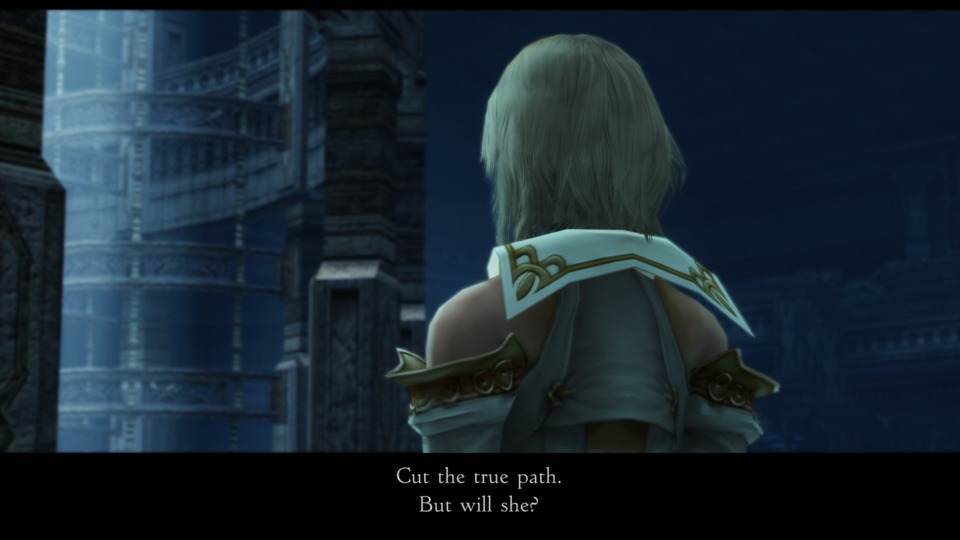
Regardless, when we make it to the top of the lighthouse, the story kicks into high gear. When Ashe declares her intent to destroy the Sun Cryst, Gabranth appears and goads her into seeking revenge. It is during this scene when Gabranth admits to killing Ashe's father by masquerading as Basch. Additionally, shocking everyone he has the brain cells to add one and one together, Vaan realizes Gabranth is responsible for murdering his brother. Ashe again rebukes Gabranth's violent suggestions, and Reddas joins and pulls out his blades and attacks the judge magister. During this confrontation, Reddas is revealed to be a former judge magister himself, and the two engage in a debate about needing to move on from one's past. Reddas admits to being a bystander to the Empire's destruction of Nabudis and recites his regret for allowing such an act of genocide to happen.
Some of you have accused me of being hard on Vaan. However, while at the Pharos Lighthouse, he truly shines as a character. When Gabranth appears, Vaan attempts to reason with him. Not only does Vaan say he's moved on from his brother's death, but he's also no longer interested in revenge. It was beyond shocking to see Vaan speak with humility and empathy, and it is a damn shame the game waited this long to show this side of him. From here, a highly cinematic battle with the judge ensues, and it's by far one of the best boss fights in the game. Correspondingly, Gabranth continues to be one of the best characters in the game. The frustration he feels when Ashe and Basch refuse to accept his gambit is beyond palpable.
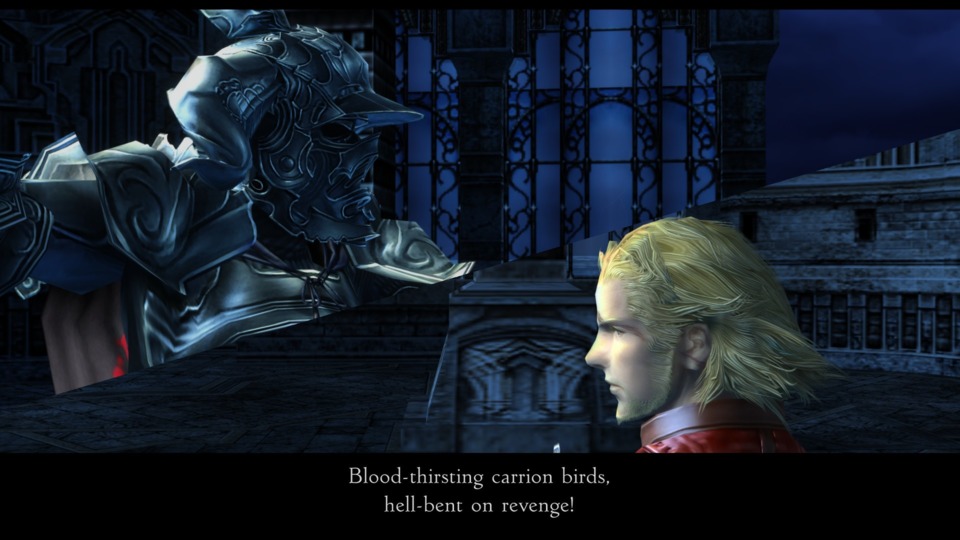
After you off Gabranth, Dr. Cid appears and chastises the judge for failing to carry out Vayne's orders. While wielding a piece of manufactured nethicite, Dr. Cid flings Gabranth across the room. Venat reappears, and Balthier accuses his father of being under its thumb. Dr. Cid corrects him and says they are "allies," and before we continue, I want to talk about this matter. One of my favorite parts of Final Fantasy XII is the fact it has a well-developed trio of villains whose motivations are easy to follow and understand. What I equally enjoy is how Vayne, Dr. Cid, AND Venat treat each other as equals rather than disposable chess pieces. When you finally defeat Dr. Cid, he doesn't belch out your usual dramatic speech. Rather, he thanks Venat for giving him the best years of his life and issues no apologies to Balthier. It's a formula break from what we expect of a Final Fantasy villain, and I LOVE IT!
After defeating Dr. Cid, Ashe attempts to destroy the Sun Cryst but fails. As she gets closer to the crystal, a deluge of mist pushes her back. Offering to do the deed for her, Reddas implores the rest of our party to seek shelter as he charges forward to the Sun Cryst. As he does, with a smile on his face, he destroys the crystal and frees humanity from the influence of the Occuria. Unfortunately, a massive explosion rocks the top of the tower, and Reddas is pronounced dead. However, and this is a WILD TANGENT, but how does everyone else survive this explosion? In the very next cutscene, we watch the entire lighthouse explode in a flurry of energy. Then, after the game smash cuts to black, our party is at the pirate city with nary a scratch.
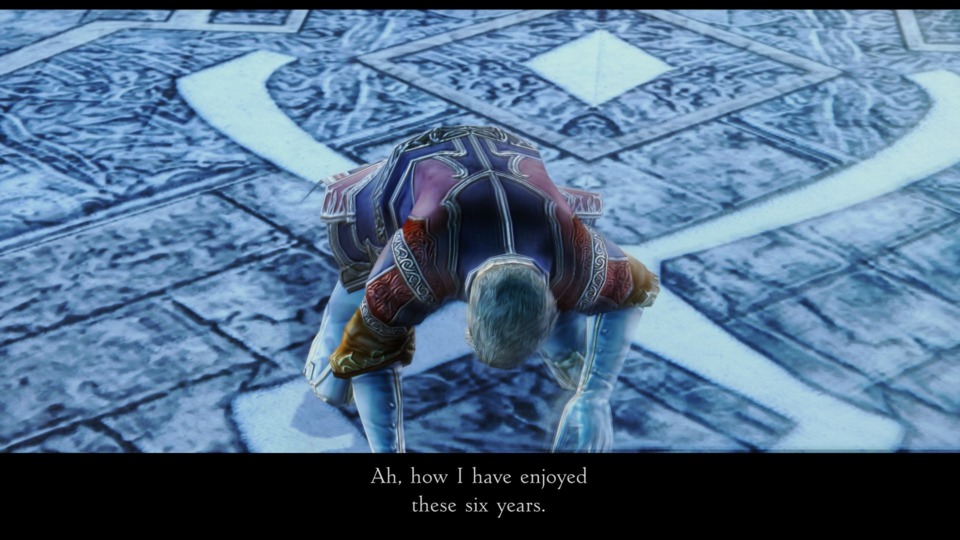
Part 57: Tying Up Loose Ends
After the events at Pharos, I avoided Final Fantasy XII's side quests like The Plague. As someone who was never entirely sold on its systems, playing the game without its heady storytelling was not appealing to me. While the game boasts a vast portfolio of side quests, these missions severely lack diversity. Most involve fighting overpowered bosses whose prep work alone necessitates hours of futzing around through menus. That is especially the case with the Hunts, which ramp up in difficulty by the game's final act. So much so, I felt like I had to spend an extra dozen hours grinding to make them even moderately viable.
I've already reviewed my distaste for the game's pacing issues, so I'll avoid repeating familiar territory here. Nonetheless, it's during these transitional moments when I feel Final Fantasy XII shows an identity crisis. It doesn't lean enough into its MMORPG tendencies to make its side quests sufficiently visible. For whatever reason, the game lacks a mission log, and quest-giving NPCs do not have iconography to distinguish them from non-quest related NPCs. Conversely, the fact the game makes these side quests multi-step endeavors, like raids in actual MMORPGs, does Final Fantasy XII no favors. Because the game is a single-player experience, you are responsible for the prep work of all six of your characters. Worse, many of these quests involve an insane amount of repetition! For example, I bet delivering Ann's letters leads to a fun character moment. However, I'm not riding around on the game's mass transit system twenty goddamn times to see that one-off moment.
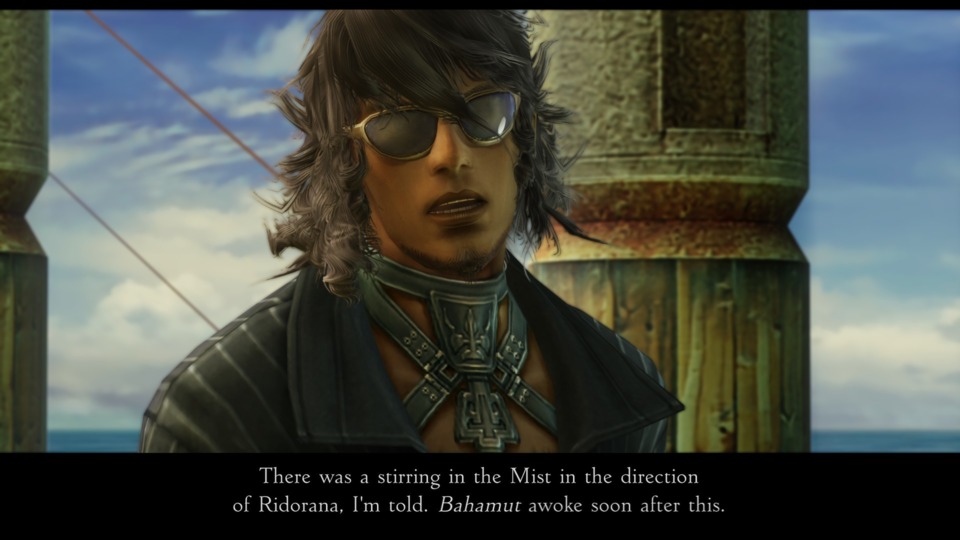
And because everything in this game is in service of the Gambit and License systems, these side quests are fucking long! Remember the quaint days of Final Fantasy VII plopping the super bosses in the world and challenging you to battle them on your own accord? Yeah, Final Fantasy XII isn't about to do that! It instead wants you to toil away fighting against endless streams of trash mobs before having the opportunity to witness its cinematic confrontations. To illustrate, challenging the Omega Mark XII super boss, involves a FORTY-THREE STEP PROCESS! WHY WOULD ANYONE DO THAT?!
There was, however, one side quest which did resonate with me. Around act two, I inadvertently activated the "Three Medallions" questline, though I did not realize this until the tail end of my playthrough. After reviewing my inventory, I came across a stone fragment and consulted a guide to see if it was loot trash or an essential story item. Upon discovering it was the first step to a long journey through the wastelands of Nabudis, I decided to give the quest a shot. Upon doing so, I was pleasantly surprised by the amount of storytelling while navigating through the charred remains of Nabudis. There's even a poignant moment when you discover your quest-givers are ghosts of long-dead citizens of Nabudis. It's not exactly "original" storytelling, but when so much of the game's optional content exists for the sake of existing, I found it a pleasant surprise.
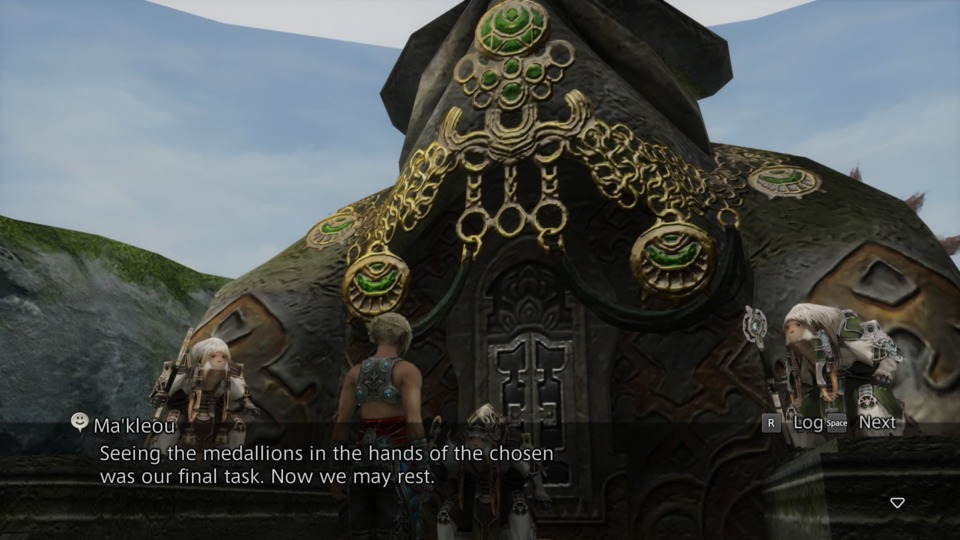
Another aspect I enjoyed about the Three Medallions questline is how it feels impactful. Upon defeating the bosses in the Necrohol of Nabudis, you feel like you lift an evil from the environment. The setting doesn't change dramatically, but it's enough of a shift where your actions mean something. This, by the way, returns me to my point regarding Final Fantasy XII's lack of environmental storytelling. For a game so focused on war and politics, I do not understand why the environments do not evolve as the story progresses. As I said before, cities like Rabanastre don't change in response to significant events. What you see in chapter one is what you get for the entire game, and it's almost as if Square-Enix is a bit too in love with its level design.
Even Final Fantasy VII had Midgar transform depending on your place in the story! In the case of Final Fantasy XII, you cannot even revisit significant events! Think back to the destruction of the Shiva during act one. It's not like you can go back and search the ruins of the 8th Fleet to grapple the awesome power of manufactured nethicite. All of the significant story sequences occur during CG cutscenes, and that guts their long-term emotional impact. Remember Operation Mi'ihen in Final Fantasy X? Remember how powerful it was to control Tidus through a beach littered with dead bodies? For whatever reason, Final Fantasy XII deprives itself of moments like those.
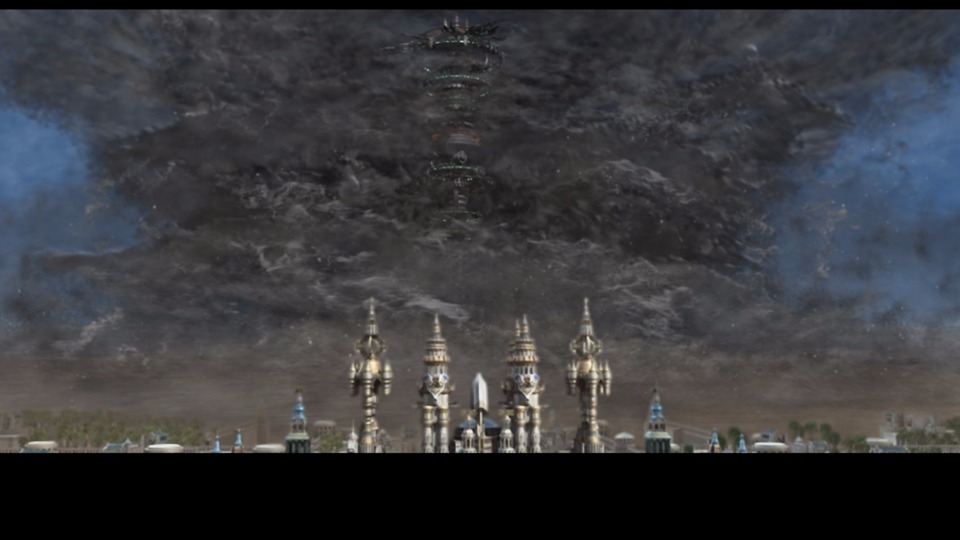
Part 58: Remember When Square-Enix Was The Best At CG Battle Scenes?
Nitpicking aside, the final five to seven hours of Final Fantasy XII are among the game's most potent. When you finally decide to initiate the game's "point of no return," it immediately rewards you with jaw-dropping CG cutscenes showcasing massive armadas going up against each other. On top of that, the designs for the Sky Fortress Bahamut and Alexander are AMAZING! I love how both ships incorporate aspects of their namesakes, yet, look like practical airships within the scope of Final Fantasy XII. Additionally, the game immediately injects some much-needed stakes by wasting away hundreds of soldiers within the first five minutes of the final act!
Moreover, I appreciate the game setting its final moments above Rabanastre. Not only is it a nice nostalgic touch, but it allows the player to grapple how far they have come. It's quaint to think back to when we were helping Vaan kill sewer rats as we infiltrate the Bahamut. More importantly, Rabanastre is where we have spent most of our time, and it is, by hook or by crook, Final Fantasy XII's most iconic environment. To return to the story at hand, there's a notable moment where Vayne and Larsa quietly debate in the nexus of the Bahamut. To once again highlight Vayne's understated nature, he tells off Larsa without resorting to physical violence. During this debate, he states war is the only solution to Ivalice's complicated mess of political jockeying. He even has a piquant Andrew Jackson-esque moment wherein he goads Larsa to fight back.
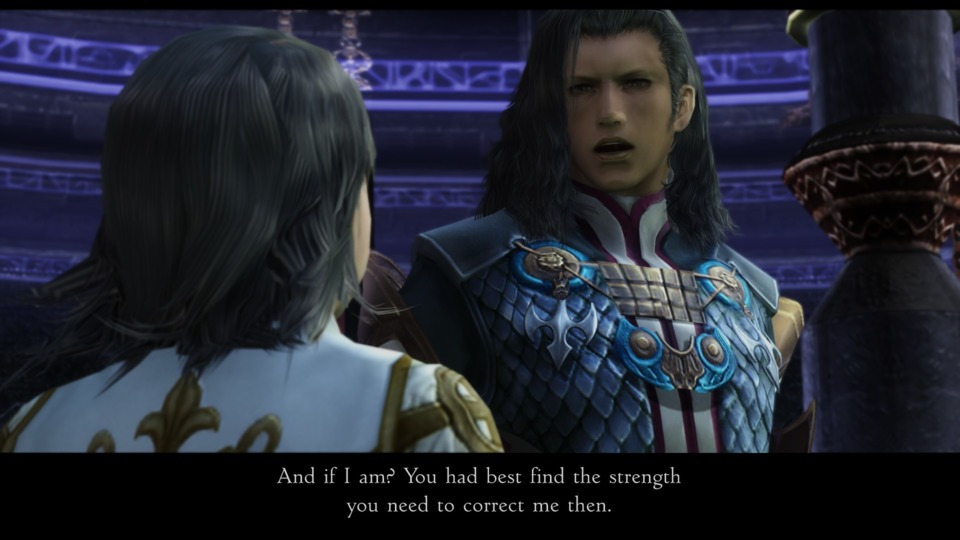
There are other small touches to the final cinematic I enjoyed as well. I loved the design of the smaller airships and wished we had seen such flying craft more prominently in the game. Likewise, when Vayne fires the first shot and rejects Marquis Ondore's olive branch, shit pops-off in dramatic fashion. The Resistance moves to counter the Empire but finds its weapons ineffective in subduing the Bahamut. As Ondore tries to brainstorm a new strategy, we watch flagship after flagship getting wasted by the Bahamut. When Ashe comes into the fold, and Ondore attempts to capture her using a tractor beam, he does so out of desperation. After spending years planning this very attack, you get the sense he knows everything is falling apart before his eyes. Conversely, Vayne earns his smug grandstanding as he is utterly untouchable during this scene.
If there is one prominent storytelling failing at this point, it is the dynamic between Vayne and Venat. In countless scenes prior, we have a clear sense of the relationship between Venat and Dr. Cid. However, the story doesn't spend enough time cluing us into how Vayne factors into things. I guess at some point, Vayne encounters the two and falls in-line with their scheme. Nonetheless, there are several scenes where Vayne addresses Venat as a peer and vice versa, and this relationship never feels authentic. One scene detailing how Vayne met Dr. Cid or why he gravitates towards his wild theories, would have done wonders for the story.
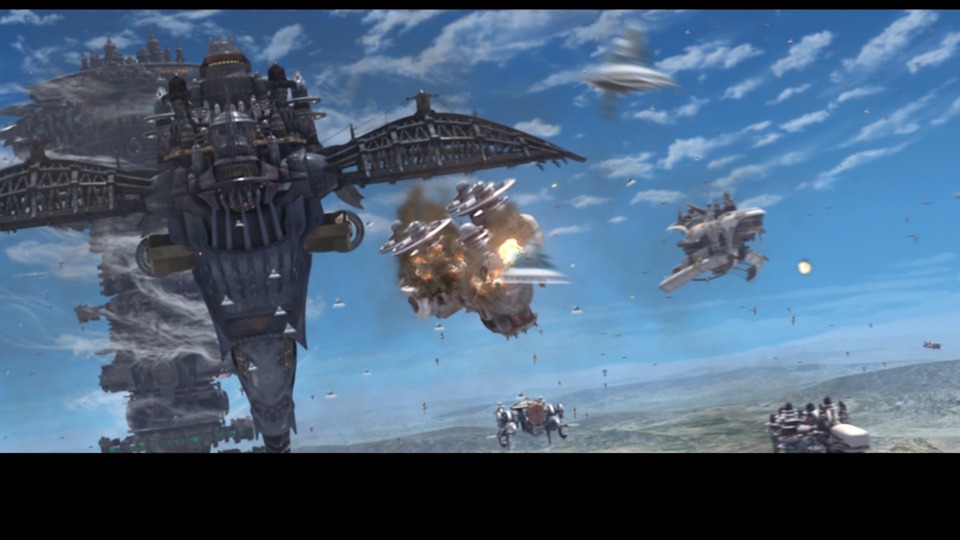
We are also ignoring the UNDENIABLE fact this scene blatantly plagiarizes the Battle of Endor from Return of the Jedi. Admittedly, Final Fantasy XII wears its Star Wars influences rather prominently, but this scene is a step too far in more ways than one. First, the Bahamut becomes the Death Star II as it picks off wayward rebel ships. Like Emperor Palpatine, Vayne sits idly on a throne as he waits for the Resistance to give up. Finally, the last hope of the Resistance is an effort to infiltrate an Imperial base. Frankly, it's weird to see Square-Enix rely on another source to guide the final moments of their game rather than themselves.
Part 59: This Game Has An Amazing Final Act, Until The Final Boss
As mentioned earlier, when Ashe attempts to board the Bahamut, Ondore initially blocks her effort. Even after reciting her destiny to wield the Throne of the Dynast King, Ondore refuses to listen to Ashe. It is not until Balthier and Vaan find a way to fake a transmission from Larsa that Ondore relents. As our party boards the monolithic Bahamut, they recognize this as the "end of the road." There's a sentimental moment where they all appreciate each other as friends before moving forward. It's a quick moment, but one I enjoyed nonetheless. What I was less enthused by was the structure of the game's final level.
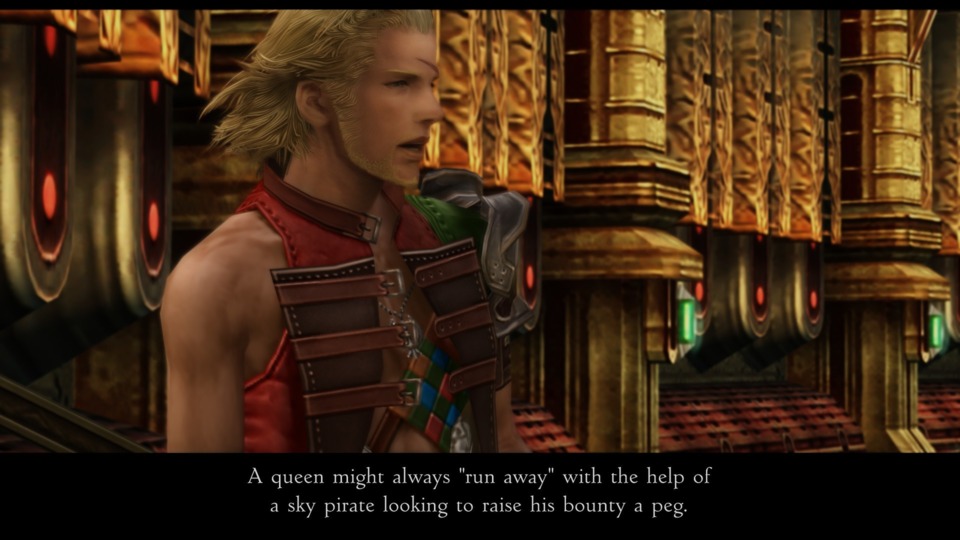
I wholeheartedly admit boss rushes are inevitable in Final Fantasy games. All told, the trope has existed since the franchise's inception. Therefore, bellyaching about Final Fantasy XII's last level providing a boss rush seems unfair. What I do feel is a salient point, is the lack of environmental storytelling. We are in the belly of the Empire's flagship, and instead of seeing soldiers and engineers toil away at weaponry or armaments, the game throws endless streams of trash mobs at you. The Bahamut feels less like an environment and more a vessel to provide a bunch of cool cutscenes. This shortcoming is a shame, because, in prior scenes, the game does a sufficient job of humanizing the foot soldiers of the Empire.
The first of these fights involve another tussle with Gabranth. This time around, the Judge Magister appears both physically and emotionally winded. He once again billows at Basch before drawing his swords. Yet again, the interplay between Basch and Gabranth provides some of the strongest voice acting performances in the franchise short of Final Fantasy XIV. The judge goes down for the count once more, and Basch has a few words with his brother, before continuing to Vayne. Upon meeting Vayne, the king greets us as he is wont to do, but what is notable is Ashe's response to his gallivanting. When Vayne asks her who she thinks she is, she responds, "I am simply myself." Not only does the line fit her perfectly, but it masterfully highlights the understated tone that defines Final Fantasy XII's story.
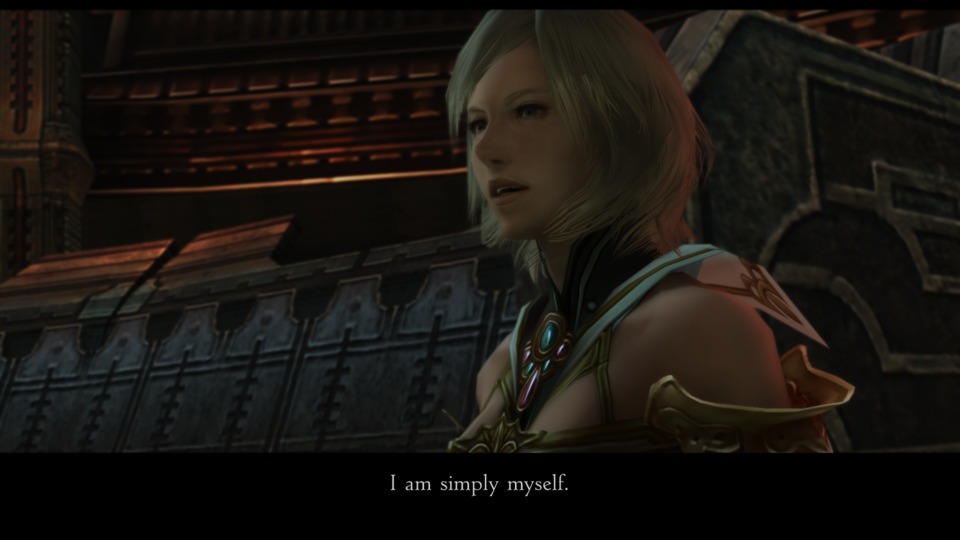
Larsa ends up joining us as we attempt to take down Vayne, having found the willpower to resist his older brother. When we defeat Vayne, he transforms into a muscle-toned super soldier pulled from the final season of The X-Files. This boss design, as well as the one that immediately follows, highlights a nitpick I have always had with the 3D era of Final Fantasy games. Whenever Square-Enix tries to re-capture the remarkable pixel-based boss transformations from the 16-bit era in 3D character models, the results are always awkward. Somewhere between Sephiroth's One-Winged Angel and Barthandelus in Final Fantasy XIII, Square's boss design became a running gag. When Vayne morphs into his final form, I couldn't help but laugh. It was as if I was fighting an anime-inspired version of "The Mothman."
Nonetheless, after Vayne's second defeat, he casts away Gabranth, mortally wounding the man, and runs away. I will admit I liked Vayne's moment with Venat, wherein he apologizes for failing them. As I said earlier, it's nice to see a troupe of villains work together to achieve a goal cohesively, rather than bark at each other like a bickering married couple. HOWEVER, the final boss battle against Vayne is a colossal pile of shit. "The Undying" being able to pierce through buffs AND make itself immune to damage, ISN'T FUN! It's cheap and makes the battle drag on far longer than it should. Worse, The Undying can cast heavy-hitting spells in quick succession; therefore, it's a guarantee you will replay this boss rush more than once.
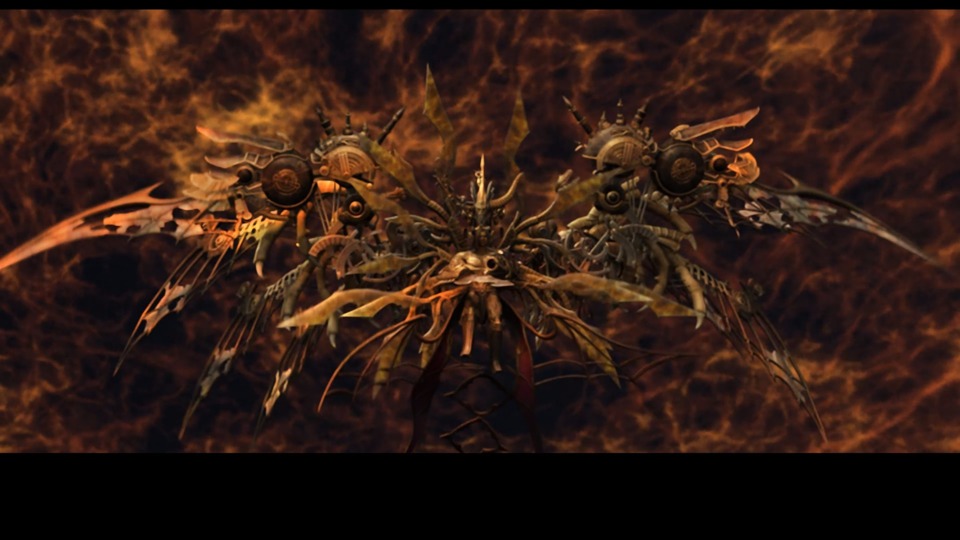
Part 60: This Game Has The Best Epilogue In Video Game History
I want to start by saying I think Final Fantasy XII's ending and epilogue are its best parts. The proper conclusion ties up the story's loose ends in style, and the epilogue provides a melancholic look at life after an adventure. The first thing that kicks things off is the death of Gabranth. Gabranth turns to Basch and begs him to take up his mantle and protect Larsa in his stead. I enjoy how Gabranth asks Basch to recognize the necessity of his request, rather than try to plead with him emotionally. Also, credit to the writers for not shoving a redemption arc down our throats. Basch honors his brother's request and with Larsa's support, orders the Empire to lay down its arms. Ashe, now as the legitimate monarch of Dalmasca, commands the rebellion to follow suit. Our attention then turns to the Bahamut, which is about to crash into Rabanastre.
Balthier tasks Vaan with piloting the Strahl as he dispatches to find a way to control the Bahamut. After rebuffing an offer by Judge Zargabaath to sacrifice himself to save Rabanastre, Balthier announces, "I'm the leading man!" Upon tinkering with the Bahamut's engine, he perilously pilots it to safety. As it begins to crash, Balthier pulls Fran from the wreckage, and she retorts what I consider the best line in the game. The Bahamut tumbles to ruin in the background, and the game smash cuts to black. It is at this point Penelo narrates the game's epilogue. We find ourselves back in Rabanastre, one year after the events of the game.
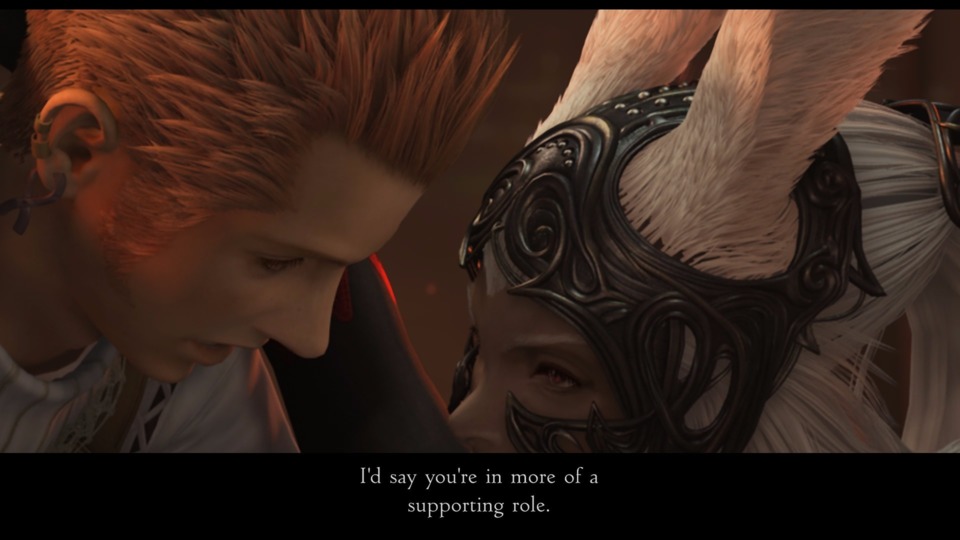
I love this epilogue. I think it might be some of the best writing Square-Enix has done outside of Final Fantasy IX or X. There are depressed undertones to Penelo's report, and that's what I think makes it more remarkable. When Penelo talks about Ashe becoming busier with her affairs ruling Dalmasca and growing further away from her friends, I immediately thought of myself. A wave of memories of close compatriots from high school and college came to mind, and much like Penelo, I mourned not being able to touch base with those contacts. But as she says in the game, "life moves on," and the friends of yesterday often become the memories of today.
I also want to praise Square-Enix for not shoving a ham-fisted romance between Basch and Ashe down our throats. There was always an inkling of a possible relationship between the two, but other duties got in the way. Tying a neat bow around the two characters (i.e., Final Fantasy IX) wouldn't have fit the tone of Final Fantasy XII. There's something both wistful and empowering about the epilogue's brutal honesty and needing to let go with one's desires to "do the right thing." Furthermore, I appreciate the game taking the time to show relationships forged during a conflict are not sustainable.
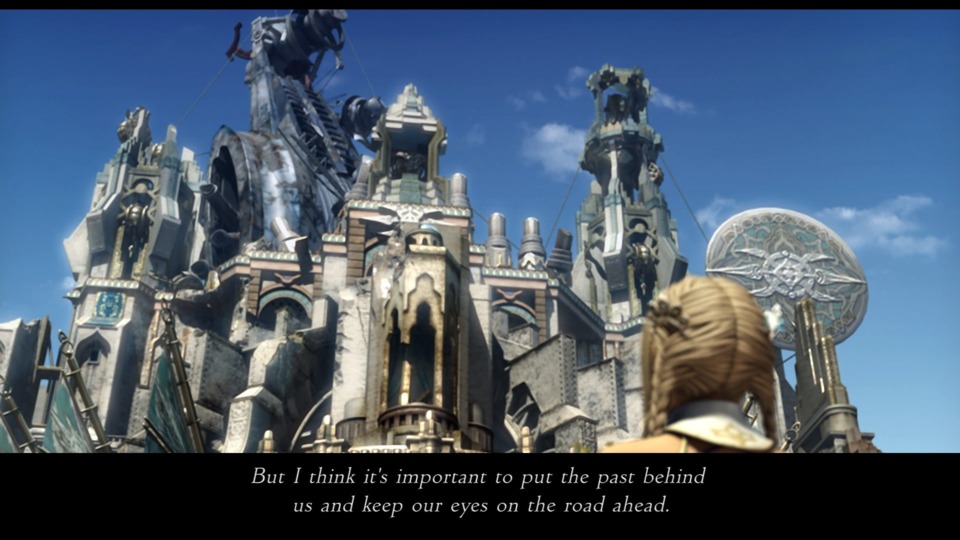
Speaking of which, I want to stop and think about that concept for a moment. Very often, we see a group of misfits band together to fight against a big evil. Rarely, if ever, do we see those adventurers try to live their lives after the defeat of this tyrannical emperor or dictator. While the epilogue of Final Fantasy XII is short, clocking in at approximately twenty minutes, it does just that! We see each character happily pursue a different destiny and, as a result, grow further apart from one another. Vaan, now a full-fledged sky pirate, can't sit down with Balthier and muse about the "good old days." Basch can't tell Ashe how he feels about her, because he needs to honor his brother's dying wish. And then you have Ashe, who can happily live without the specter of her dead husband looming over her. However, in doing so, she needs to forgo her friends and potential love interest. I have to say, in these final moments, Square-Enix crafts an uncharacteristically restrained but poignant moment, and that's truly remarkable.
Postmortem: Should You Play Final Fantasy XII?
It seems so atypical of me to end a Final Fantasy game with such a loaded question. Amateur critics will end their exhaustive reviews with such prompting, thus invalidating the mountains of text they had written. For me, I include the question over whether or not you should play Final Fantasy XII as a segue to my overall conflicted feelings about the game. Despite my emotional fits, I want each of you to know I did not hate this game. Parts of it frustrated me, and there's no denying that, but "hate" is far from what I would say is my summative feelings about the game.
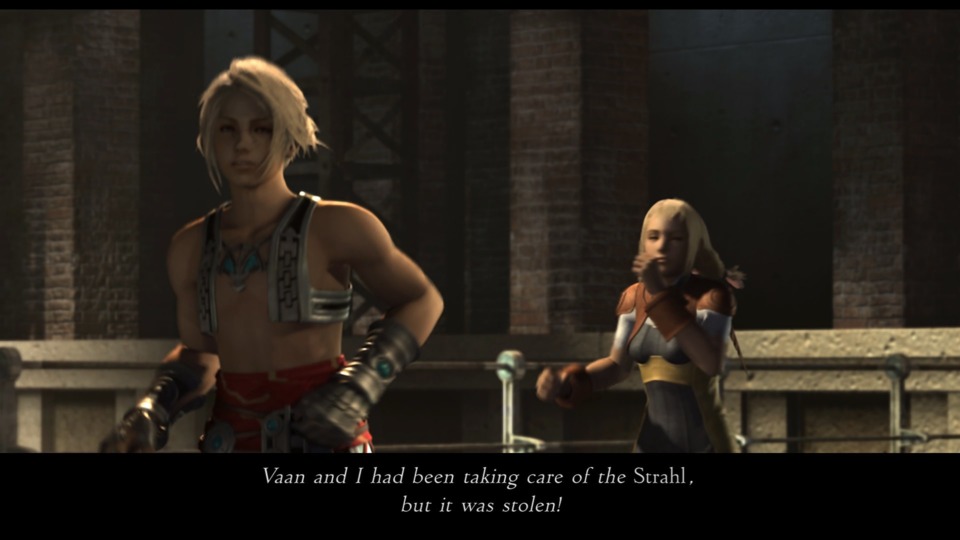
If anything, I walk away from Final Fantasy XII, knowing why people love it. It is a rare game where you can play it dozens of times, over and over, and still discover new parts and pieces which reframe your understanding of its core mechanics. From start to finish, it rewards your investment into its systems with exhilarating pizzaz and silky smooth character animations. Likewise, it represents an era of Square-Enix that no longer exists. With its release, the company was still at the bleeding edge of video game technology. Finally, in terms of storytelling, Final Fantasy XII is one of Square-Enix's most compelling narrative offerings.
I don't think I have ever been as thoroughly impressed with the characterization in a Square-Enix game, as I have with Final Fantasy XII. While the decision to go with Vaan as the player's cipher is lamentable, even he has some genuinely potent story moments. Characters like Ashe, Basch, and Balthier are going to stick with me for years to come. However, Final Fantasy XII's greatest storytelling accomplishment lies in how it crafts an authentic trio of villains. A trio, mind you, who are as understandable and transparent about their motivations as the primary cast. Vayne, Dr. Cid, and Vanat are beyond irredeemable monsters, but they are monsters with a kernel of good you can follow. I'm not lying when I say I may have enjoyed Dr. Cid as much as I did Ashe or Balthier. And we can't forget about Gabranth and Larsa! Both of whom I think outshines the vast majority of our playable characters.

But in the end, I did not like playing Final Fantasy XII. I would not play it on a boat. I would not play it in a moat. I would not play it in a box. I would not play it with a fox. I understand a lot of people like the Gambit and License systems, but I found them convoluted and tedious. As I mentioned in a prior episode, I make no qualms about my belief Final Fantasy XII's move to real-time combat was an error. To this day, I maintain turn-based combat is more conductive to role-playing, in the single-player Final Fantasy games, than automated systems or hotkeys. Yet, Square-Enix continues to believe the "magic sauce" of making this franchise appeal to new audiences is to keep tinkering with their gameplay systems. Instead of aging with their audience, they have engaged in this reckless endeavor of trying to tap into gaming zeitgeists that do not match the appeal of their hallmark franchise. Why else did they add quick-time events to Final Fantasy XIII-2?
Admittedly, Final Fantasy XII is a highwater mark in the franchise for many people, and I get that. The game is both artistically and mechanically ambitious. However, it is a testament to how broken this game was when it first launched that Square-Enix in the year of our lord, 2019, is still repairing Final Fantasy XII's gameplay systems! For fucks' sake, the Switch and Xbox One versions recently added a respec option as well as a "save Gambit" feature! And I would even argue the game's defenders often forget how much "dead time" is in Final Fantasy XII. Sure, people are apt to point out how efficient the Gambit System can be, but those same people don't talk about the game's long aimless treks through barren deserts or needing to uncover random treasure chests to gain critical magical spells.
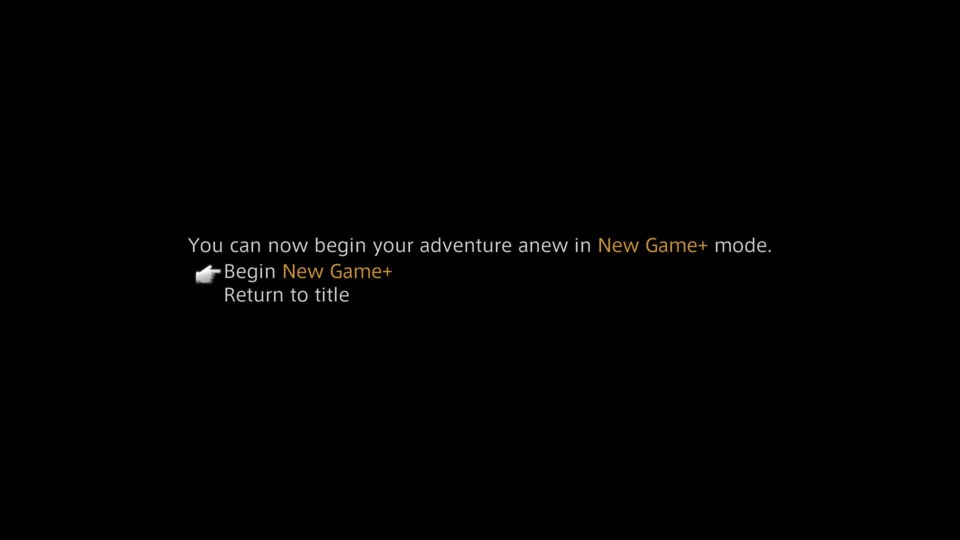
And while I enjoyed Final Fantasy XII's story, it's not like it is perfect in and of itself. For one thing, it's slow. The story spends the better part of two acts funneling you through one open-world dungeon after another without any grounding in the world. Sure, characters like Basch, Ashe, and Balthier are charming, but until the game's midpoint, the only thing keeping them together is a convenient series of magical MacGuffins. And characters like Vaan take their sweet-ass time to go from being downright intolerable to marginally interesting. Likewise, characters like Penelo and Fran spend the entire game serving no purpose other than being exploitative eye-candy!
I'm not going to lie; this game was a bummer. I've played my fair share of good and bad Final Fantasy games, but this is the one I most wanted to enjoy. I wanted the mechanics to "click" with me, but they didn't. However, I'm not going to use this blog to extol how anyone who enjoys this game is "wrong." If that's the message you pulled from this nigh 9,000-word dissertation, then I want to apologize forthrightly. You have a right to enjoy this game, and I have no right to take that away from you. All I want to say is the Final Fantasy franchise used to be one of the most welcoming JRPG series for newcomers, and at some point, that disappeared. My theory is Final Fantasy XI is the culprit, but Final Fantasy XII is a definite "point of no return" as well.
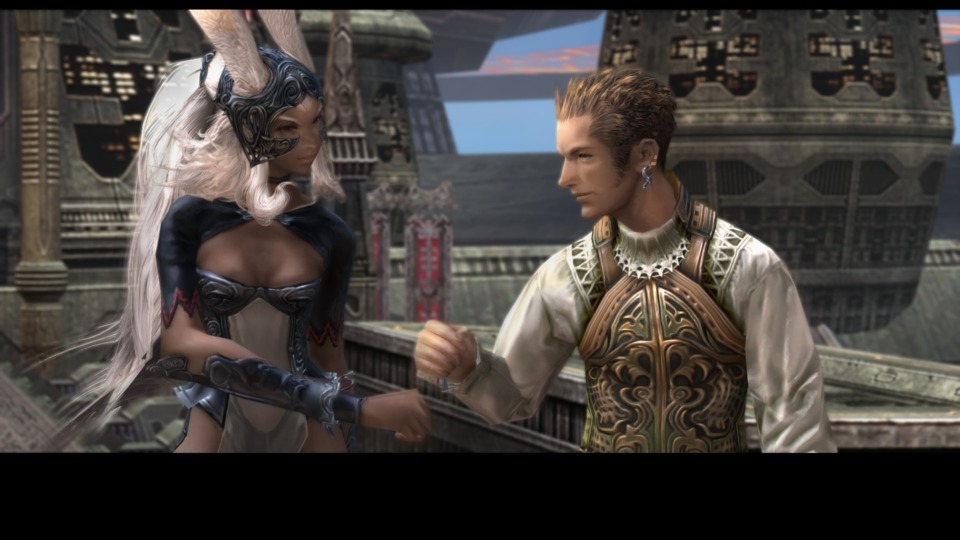
Before I end this blog, I am going to break with tradition and spoil the next game for my Final Fantasy blog series. After playing Final Fantasy XII for the better part of a year, I decided it was time to scrape the bottom of the Final Fantasy barrel. Now, quiet down, my dear children, for my heart is not ready for the Final Fantasy spin-off games. Nor will I be playing Final Fantasy XIII-2. However, next time you see me, I'm going to talk to you about OG Final Fantasy II, a game many people regard as "the worst Final Fantasy game ever made." So, get ready to punch yourself in the face, because this next rodeo is going to be a whole different can of worms!

